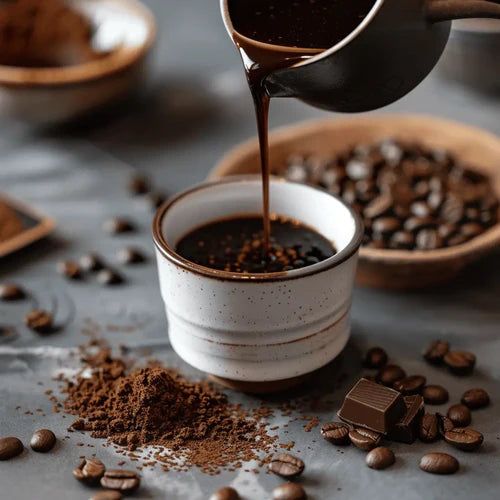Brazilian coffee beans hold a special place in the hearts of coffee lovers around the world. Known for their rich flavors and smooth profiles, Brazilian coffee beans offer a delightful experience with every sip. This blog will explore why Brazilian coffee beans are unique, focusing on their growing regions, processing methods, and the distinct characteristics that set them apart.
Diverse Growing Regions
Brazil is the largest coffee producer globally, and its diverse regions contribute to the uniqueness of best Brazilian coffee beans. Some key regions include:
1.Minas Gerais
Known for its high-altitude farms, Minas Gerais produces coffee beans with a naturally sweet flavor and complex profiles. The region's climate and soil conditions are ideal for growing high-quality Arabica beans.
2.São Paulo
The Mogiana region in São Paulo is famous for its smooth, chocolatey coffee beans with low acidity. The combination of high altitudes and mild temperatures creates the perfect environment for cultivating the best coffee beans.
3.Bahia
A newer coffee-growing region, Bahia is known for its innovative farming techniques and high productivity. The coffee beans from this region often have a bright and acidic profile, thanks to the fully washed processing method used here.
Unique Coffee Bean Varieties
Brazil grows a wide range of coffee bean varieties, each contributing to the country's diverse coffee landscape. Some notable varieties include:
- Yellow Bourbon: This variety is prized for its sweet, fruity flavors and smooth body. It's a favorite among top specialty coffee roasters.
- Catuai: A hybrid of Mundo Novo and Caturra, Catuai offers a balanced flavor with hints of sweetness and nuttiness. It's known for its resilience and high yield.
- Mundo Novo: Known for its robustness, Mundo Novo has rich chocolate and nutty notes, making it ideal for espresso blends.
Top 3 Coffee Bean Processing Methods
Brazilian coffee bean processing methods significantly impact the flavor and quality of the beans. The most common methods include:
- Natural (Dry) Process: In this traditional method, coffee cherries are dried with the fruit still attached, leading to a sweet, fruity flavor. The dry climate in many Brazilian regions is perfect for this process, which enhances the beans' natural sugars.
- Pulped Natural (Semi-Washed) Process: The cherry skin is removed before drying, resulting in a cleaner taste with balanced acidity. This method combines the best of both natural and washed processes, producing coffee beans with rich flavors and a smooth body.
- Fully Washed (Wet) Process: Commonly used in the Bahia region, this method involves pulping, fermenting, and washing the cherries before drying. It results in a bright and acidic flavor profile, highlighting the beans' inherent characteristics.
Flavor Profiles and Tasting Notes of Brazilian Coffee Beans
Brazilian coffee beans are known for their wide range of flavors, making them a versatile choice for various brewing methods. Common tasting notes include:
-
Chocolate: Many Brazilian coffees have rich chocolate undertones, making them a popular choice for espresso and blends.
- Nuts: Almond and hazelnut flavors are prevalent in Brazilian coffee beans, adding a smooth and creamy texture.
- Caramel: Some varieties exhibit sweet caramel notes, enhancing the overall richness of the coffee.
- Fruits: While less common, certain Brazilian coffees can have subtle fruity notes, particularly those processed using the fully washed method.
Brazilian Coffee Culture
Brazilian coffee culture is deeply ingrained in the country's history and daily life. Coffee is not just a beverage but a social experience in Brazil. Here are some aspects of Brazilian coffee culture:
- Cafézinho: A small, strong cup of coffee often served with sugar. It's a staple in Brazilian households and is offered as a gesture of hospitality.
- Specialty Coffee Shops: The rise of specialty coffee shops in Brazil has introduced consumers to high-quality, single-origin coffees. These shops focus on showcasing the unique flavors and profiles of Brazilian coffee beans.
- Coffee Festivals: Events like the Brazilian Coffee Week celebrate the country's rich coffee heritage. These festivals offer tasting sessions, workshops, and the opportunity to meet local coffee producers.
Sustainability and Ethical Practices
Many Brazilian coffee producers are committed to sustainability and ethical practices. Certifications such as Fair Trade, Rainforest Alliance, and UTZ Certified indicate that the coffee has been produced with consideration for the environment and the welfare of the farmers.
1.Sustainable Farming:
Producers are increasingly adopting sustainable farming practices, such as shade-grown coffee and organic farming, to protect the environment and improve the quality of their beans.
2.Fair Wages:
Ethical certifications ensure that farmers receive fair wages, contributing to better living conditions and economic stability for coffee-growing communities.
Conclusion
Brazilian coffee beans are unique for their diverse growing regions, distinct processing methods, and rich flavor profiles. Whether you're enjoying a cafézinho in Brazil or savoring a cup of Brazilian coffee beans for premium espresso coffee in the UAE, each sip offers a taste of the country's rich coffee heritage. By choosing Brazilian coffee beans, you're not only indulging in a delightful beverage but also supporting sustainable and ethical coffee production.
By understanding what makes Brazilian coffee beans unique, you can better appreciate the intricate flavors and high quality that these coffee beans bring to your cup. Enjoy your coffee journey with Brazilian coffee beans and explore the wide array of top options available to you.

